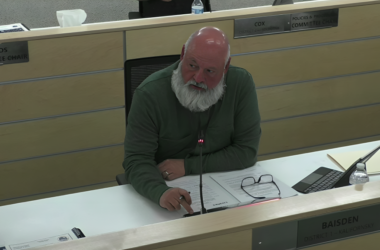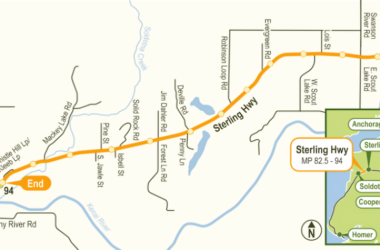The Kenai Peninsula Borough Assembly is weighing a major shift in the borough’s sales tax structure, proposing a seasonal rate that would see residents and visitors pay 4% sales tax during the second and third quarters of each year—the summer tourism season—and 2% during the first and fourth quarters, traditionally slower months.
Sponsored by Assembly Vice President Kelly Cooper and Borough Mayor Peter Micciche, Ordinance 2025-15 stems from recommendations made by the Tourism Industry Working Group (TIWG), a panel tasked with exploring ways to ensure visitors pay their fair share for public services.
“This is essentially one of the recommendations that was brought forth by the tourism industry work group,” said Assembly member Ryan Tunseth. “It results in a net-neutral change for residents, subject to voter approval.”
The ordinance received initial support during its July 8 introduction, with several Assembly members voting to advance it to public hearing. However, it also sparked immediate debate, with members raising concerns about whether enough public input had been gathered outside of the tourism sector.
But Assembly member Tyson Cox argued the ordinance was premature and lacked comprehensive input from local businesses and residents not tied to the tourism economy.
“The TIWG was not organized to consider repercussions of taxes on the general public or businesses outside of the tourism industry,” Cox wrote in a memo accompanying Resolution 2025-030, which he sponsored to establish a broader Seasonal Tax Working Group. That resolution was postponed to August 5 in a narrow 5–4 vote.
Cox’s memo outlined several concerns: that the seasonal sales tax proposal might increase costs for residents during the months they typically undertake major expenses, like home repairs, and that it would impose a 1% increase on unprepared food purchases during summer months—a category that’s currently untaxed year-round.
Cox also submitted a comparison spreadsheet analyzing his alternative proposal for a 12% lodging tax—a move that would shift the tax burden primarily to visitors. According to his analysis, both the lodging tax and seasonal sales tax would increase borough revenue and allow for a potential reduction in the borough’s property tax mill rate. However, the seasonal sales tax would also raise costs for local residents.
Despite his concerns with the seasonal tax concept, Cox emphasized the importance of giving proposals a fair hearing by allowing them to be introduced in the first place.
“I want to make a very clear statement that I am not for not introducing things,” Cox said during the meeting. “We’ve had at least four items in the last year or so that may not have been introduced. And as much as Miss Cooper may not like doing a working group for several things, I don’t like the idea of not allowing Assembly members to introduce items.”
Cox said he would vote yes to introduce the ordinance and called for unanimous consent—signaling that debate and public input are part of the legislative process, regardless of where individuals stand on the issue.
Assembly members Willy Dunne and Tyson Cox both echoed support for public hearings, even if they remain skeptical of the proposal itself.
“I do think the public should have a chance to have a hearing on this,” Dunne said. “But I do have serious concerns about the ordinance.”
Mayor Micciche’s office has said the seasonal approach better aligns with borough-wide revenue needs and infrastructure demands during peak tourism months. The ordinance includes a clause stating the increased summer revenue may allow for a property tax mill rate reduction of 0.3 to 0.4 mills—a statement Cooper says she plans to amend for clarity before the August hearing.
“It was intended to say the additional revenue may provide for a reduction,” Cooper said during the July 8 meeting. “There will also be ballot language coming forth at that hearing.”
If passed, the ordinance would place the seasonal sales tax question before borough voters this fall. In the meantime, Resolution 2025-030—calling for a dedicated working group to study the impacts on residents and businesses—remains on the table, with a final vote expected at the August 5 Assembly meeting.
The public hearing on Ordinance 2025-15 is also scheduled for August, offering residents a chance to weigh in on whether a higher summer sales tax is worth the promise of lower property taxes.






